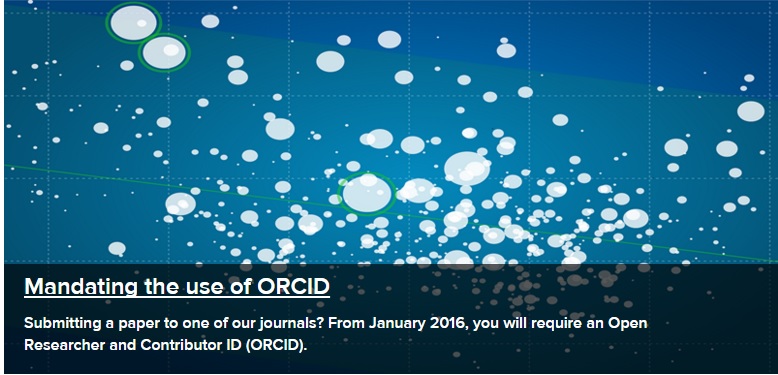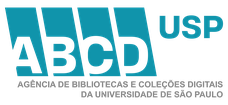Grupo de editores internacionais passa a exigir identificador ORCID para autores, a partir de 2016

Um grupo de oito editores anunciou que, a partir de 2016, começará a exigir dos seus autores o uso do identificador ORCID (iD) durante o processo de publicação. A American Geophysical Union (AGU), eLife, EMBO, Hindawi, o Institute of Electrical & Electronics Engineers (IEEE), a Public Library of Science (PLOS), e a American Association for the Advancement of Science (AAAS) – editora da revista Science – se juntam à The Royal Society que, desde 1º de janeiro de 2016, exige dos seus autores a inclusão do identificador na submissão do artigo – no sentido de tornar seu uso obrigatório [1]. O anúncio foi feito pela Diretora de Comunicações do ORCID, Alice Meadows.
Os ORCID iDs são identificadores persistentes que distinguem uma pessoa de outra. Usando um ORCID iD (Open Researcher and Contributor ID) os pesquisadores são facilmente e corretamente conectados com suas atividades, resultados de pesquisa, publicações e afiliações. Mais de 200 plataformas de pesquisa e sistemas de workflow coletam e conectam IDs de pesquisadores: programas de bolsas e concessões de subvenções por parte de agências governamentais e de fomento à pesquisa, sistemas de publicação, de gestão e universidades. A interoperabilidade de sistemas garante a correta atribuição e rápida identificação de autores e suas pesquisas.
De acordo com Mark Patterson, diretor executivo da eLife, uma das três organizações originais por trás dessa iniciativa, “Há uma premente necessidade de se melhorar a forma como os pesquisadores são avaliados. ORCID ajuda fornecendo uma identificação única para um indivíduo, facilitando o reconhecimento de sua contribuição de pesquisa. A eLife está muito feliz por fazer parte desta iniciativa que visa incentivar a adoção mais ampla do ORCID.”
Veronique Kiermer, Editora Executiva da PLOS, outra organização apoiadora do ORCID, acrescenta: “PLOS está empenhada em fornecer o devido crédito a todos os
pesquisadores que contribuem para o trabalho que publicamos e vemos o ORCID como um meio essencial para alcançar isso. ” Stuart Taylor, Diretor de Publicação da Royal Society, diz: “Nós reconhecemos o grande valor potencial do ORCID ao sistema de pesquisa. Acreditamos que os editores têm um papel fundamental na promoção dos sistemas que fornecem apoio aos pesquisadores e à ciência.”
Laure Haak, Diretora Executiva do ORCID, considera bem-vinda a iniciativa: “Esta ação por parte dos editores promove a descoberta – e, em última análise o reconhecimento – dos pesquisadores e também significa que os editores irão utilizar as melhores práticas para a implementação do ORCID: uma vitória para todos. “
Em outubro de 2015, a Universidade de São Paulo (USP), por meio de seu Sistema Integrado de Bibliotecas (SIBiUSP), promoveu o Workshop ORCID USP: Autoridade e Integração de Dados para discutir junto a pesquisadores, autores, editores, profissionais de informação, gestores e assessores de pesquisa as vantagens e procedimentos de adoção de identificadores digitais persistentes.
ORCID – Open Researcher and Contributor ID (http://www.orcid.org)
ORCID é uma organização inclusiva e aberta sem fins lucrativos que representa todas as partes interessadas no processo de comunicação científica e acadêmica. Seu objetivo é consolidar um único Identificador Digital de Pesquisador aberto, gratuito e integrado em nível global. O ORCID provê um identificador digital persistente que distingue um pesquisador de outro e garante a integração nos fluxos das atividades científicas, desde a submissão de manuscritos até a publicação de artigos, registro em bases e bancos de dados, suportando ligações entre o pesquisador e suas atividades profissionais, e garantindo que seu trabalho seja automaticamente reconhecido.
Parceiros fundadores: Elsevier (Scopus), Thomson Reuters, Crossref, F1000, Nature, ImpactStory, etc.
Parceiros integradores de dados: CHORUS, DataCite, euroCRIS, ISNI, RDA, SHARE, etc.
Adoção e programas de integração: Boston University, Texas A&M University, Cornell University, etc.
Membros: AAAS, AAS, ACS, AGU, APS, British Library, Caltech, Carlos III Universidad Madrid, CERN, Harvard University, IEEE, IOP, MIT, Plum Analytics, Proquest, PLOS, Springer, SSRN, etc.
Referência
[1] Message from:
From: “Meadows, Alice” <a.meadows@orcid.org>
“Meadows, Alice” <a.meadows@orcid.org>
Date: Mon, 4 Jan 2016 20:37:07 +0000
EMBARGOED TILL 9.00AM GMT, JANUARY 7, 2016
Publishers to Require ORCID Identifiers for Authors
A group of seven publishers today announced that, during 2016, they
will begin requiring authors to use an ORCID identifier (iD) during
the publication process. The American Geophysical Union (AGU), eLife,
EMBO, Hindawi, the Institute of Electrical & Electronics Engineers
(IEEE), and the Public Library of Science (PLOS) will join the Royal
Society – which already (as of January 1, 2016) requires its authors
to include iDs at submission – in making this commitment.
ORCID iDs are persistent identifiers for people. Using an ORCID iD
ensures that researchers can be easily and correctly connected with
their research activities, outputs, and affiliations. Over 200
research platforms and workflow systems collect and connect iDs from
researchers: grant application and publishing systems, association
management systems, and university CRIS and other research information
systems.
Over 1.8 million researchers globally have registered for an iD,
understanding the value a digital name provides in enhancing
discoverability and reducing their reporting paperwork. Some funders
have started to require ORCID iDs as part of the grant proposal
process, and in a recent survey researchers indicated strong support
for similar requirements by publishers.
According to Mark Patterson, Executive Director of eLife, one of the
three original organizations behind this initiative: “There is a
pressing need to improve the way researchers are evaluated. ORCID
helps by providing a unique ID for an individual which makes it easier
for researchers to gain recognition for all of their research
contributions. eLife is very happy to be part of this initiative aimed
at encouraging broader adoption of ORCID.”
Veronique Kiermer, Executive Editor of PLOS, another of the original
organizations, adds: “PLOS is committed to providing due credit to all
researchers who contribute to the work we publish and we see ORCID as
an essential means to achieve this.”
While Stuart Taylor, Publishing Director at the Royal Society – the
third organization – says:
“We recognize the great potential value of ORCID to the research
system. We believe that publishers have a key role in promoting
systems that provide support to researchers and to science.”
Laure Haak, Executive Director of ORCID, also welcomes this
initiative: “This action by publishers will help improve
discoverability – and ultimately recognition – for researchers, and
also means that publishers will use best practice for implementing
ORCID: a win for everyone.”
ABOUT ORCID:
ORCID (http://orcid.org) is a community-driven non-profit organization
that aims to solve the name ambiguity problem in research and
scholarly communications. ORCID maintains a central registry of
unique identifiers for individual researchers and provides open and
transparent processes for connecting ORCID iDs with persistent
identifiers for people, organizations, and research activities and
outputs. Connecting these identifiers can improve the research and
scholarly discovery process, reduce reporting burdens, increase the
efficiency of research funding, and support sharing and collaboration
within the research community. For more information contact Laurel
Haak, ORCID Executive Director, at l.haak@orcid.org.
Alice Meadows
Director of Communications, ORCID
a.meadows@orcid.org
orcid.org/0000-0003-2161-3781
Como citar este post [ABNT/NBR 6023/2002]:

